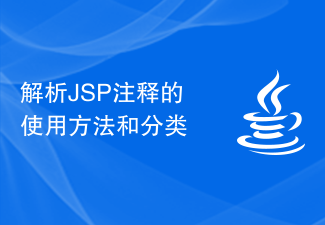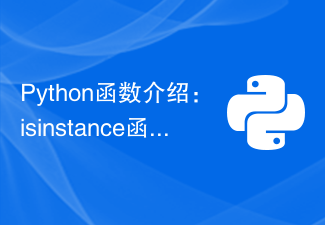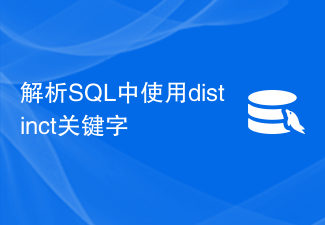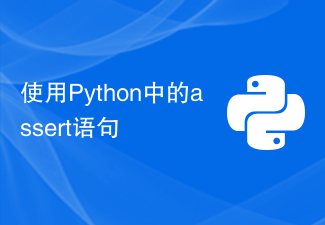
Basic concepts and usage of pointers in C language
In C language, pointers are a powerful and important concept. Although beginners may find pointers complex, understanding the basic concepts and usage of pointers will open new doors for programmers, allowing them to better understand and master the C language.
-
Definition and declaration of pointer
A pointer is a variable whose value is the memory address of another variable. To define a pointer variable, we can use the following syntax:数据类型 *指针变量名;
For example, we can define a pointer variable pointing to an integer type:
int *ptr;
In this way, we create a variable named
ptris a pointer variable pointing to an integer type. -
Assignment of pointers
To make the pointer point to a variable, we can use the&operator to get the address of the variable and assign it to pointer variable. For example, assuming we have an integer variable namednum, we can assign its address toptr:int num = 10; int *ptr = #
Now,
ptrThe pointer points to thenumvariable. -
Dereference of pointer
Dereference refers to accessing the value of the variable pointed to by the pointer through a pointer. To dereference a pointer, we can use the*operator. For example, we can use the following code to print the value of the variable pointed to by theptrpointer:printf("%d", *ptr);
At this time, the value of
numwill be printed out, that is,10. -
Operations of pointers
Pointers also support some arithmetic operations. For example, we can use the-operators to offset the pointer. The offset depends on the size of the data type pointed to by the pointer. For example, assumingptrpoints to the first element of an array of integers, we can access the other elements of the array in the following way:*(ptr + i) // 访问第i个元素
where
iis an integer Value indicating the position of the element to be accessed. At the same time, pointers also support--operators, which are used to perform increment or decrement operations on the basis of pointers. - Uses of pointers
Pointers can be used in a variety of scenarios, including but not limited to the following aspects: - Dynamic memory allocation: Using pointers, we can Allocate the memory you need and free it when it is no longer needed. This is a common C programming technique.
- Passing parameters: Passing pointers as parameters by reference allows you to modify the value of the original variable in the function instead of just passing a copy.
- Accessing large data structures: By using pointers, we can avoid copying large amounts of data between functions and improve the efficiency of the program.
The following is a sample code that demonstrates the basic concepts and usage of pointers:
#include <stdio.h>
int main() {
int num = 10;
int *ptr = #
printf("Value at ptr: %d
", *ptr);
printf("Address stored in ptr: %p
", ptr);
*ptr = 20; // 修改num的值
printf("Updated value at ptr: %d
", *ptr);
return 0;
}In this example, we define an integer variable num and A pointer to an integer ptr. First, we use the & operator to get the address of num and assign it to ptr. Then, we get the value of num by dereferencing ptr and print it out. Next, we modify the value of the variable pointed to by ptr and print the updated value again.
By learning and understanding the basic concepts and usage of pointers, we can better understand and master the C language and make our programs more efficient and powerful. Mastering pointers will become the cornerstone for us to further study and apply C language.
The above is the detailed content of Basic pointer concepts and application examples. For more information, please follow other related articles on the PHP Chinese website!
 解析JSP注释的使用方法和分类Feb 01, 2024 am 08:01 AM
解析JSP注释的使用方法和分类Feb 01, 2024 am 08:01 AMJSP注释的分类及用法解析JSP注释分为两种:单行注释:以结尾,只能注释单行代码。多行注释:以/*开头,以*/结尾,可以注释多行代码。单行注释示例多行注释示例/**这是一段多行注释*可以注释多行代码*/JSP注释的用法JSP注释可以用来注释JSP代码,使其更易于阅
 如何正确使用C语言的exit函数Feb 18, 2024 pm 03:40 PM
如何正确使用C语言的exit函数Feb 18, 2024 pm 03:40 PMc语言exit函数怎么用,需要具体代码示例在C语言中,我们常常需要在程序中提前终止程序的执行,或者在某个特定的条件下退出程序。C语言提供了exit()函数来实现这个功能。本文将介绍exit()函数的用法,并提供相应的代码示例。exit()函数是C语言中的标准库函数,它包含在头文件中。它的作用是终止程序的执行,并且可以带一个整型
 Python函数介绍:isinstance函数的用法和示例Nov 04, 2023 pm 03:15 PM
Python函数介绍:isinstance函数的用法和示例Nov 04, 2023 pm 03:15 PMPython函数介绍:isinstance函数的用法和示例Python是一门功能强大的编程语言,提供了许多内置函数,使得编程变得更加方便和高效。其中一个非常有用的内置函数是isinstance()函数。本文将介绍isinstance函数的用法和示例,并提供具体的代码示例。isinstance()函数用于判断一个对象是否是指定的类或类型的实例。该函数的语法如下
 Python函数介绍:abs函数的用法和示例Nov 03, 2023 pm 12:05 PM
Python函数介绍:abs函数的用法和示例Nov 03, 2023 pm 12:05 PMPython函数介绍:abs函数的用法和示例一、abs函数的用法介绍在Python中,abs函数是一个内置函数,用于计算给定数值的绝对值。它可以接受一个数字参数,并返回该数字的绝对值。abs函数的基本语法如下:abs(x)其中,x是要计算绝对值的数值参数,可以是整数或浮点数。二、abs函数的示例下面我们将通过一些具体的示例来展示abs函数的用法:示例1:计算
 使用苹果快捷指令的方法Feb 18, 2024 pm 05:22 PM
使用苹果快捷指令的方法Feb 18, 2024 pm 05:22 PM苹果快捷指令怎么用随着科技的不断发展,手机已经成为了人们生活中不可或缺的一部分。而在众多手机品牌中,苹果手机凭借其稳定的系统和强大的功能一直备受用户的喜爱。其中,苹果快捷指令这一功能更是让用户们的手机使用体验更加便捷和高效。苹果快捷指令是苹果公司为其iOS12及更高版本推出的一项功能,通过创建和执行自定义指令,帮助用户简化手机操作流程,以达到更高效的工作和
 教你使用Win10的快捷键Dec 30, 2023 am 11:32 AM
教你使用Win10的快捷键Dec 30, 2023 am 11:32 AMwindows10常用快捷键可以为我们省去很多的时间,今天给大家介绍一些常用的快捷键用法,非常的方便快捷,下面一起来看看具体的使用方法吧。Win10快捷键用法介绍复制、粘贴和其他常规键盘快捷方式按此键执行此操作Ctrl+X剪切选定项Ctrl+C(或Ctrl+Insert)复制选定项Ctrl+V(或Shift+Insert)粘贴选定项Ctrl+Z撤消操作Alt+Tab在打开的应用之间切换Alt+F4关闭活动项,或者退出活动应用Windows徽标键+L锁定电脑Windows徽标键+D显示和隐藏桌面F
 解析SQL中使用distinct关键字Feb 18, 2024 pm 09:21 PM
解析SQL中使用distinct关键字Feb 18, 2024 pm 09:21 PMSQL中distinct用法详解在SQL数据库中,我们经常会遇到需要去除重复数据的情况。此时,我们可以使用distinct关键字,它能够帮助我们去除重复数据,使得查询结果更加清晰和准确。distinct的基本使用方法非常简单,只需要在select语句中使用distinct关键字即可。例如,以下是一个普通的select语句:SELECTcolumn_name
 使用Python中的assert语句Feb 19, 2024 am 09:45 AM
使用Python中的assert语句Feb 19, 2024 am 09:45 AMPython中的assert语句是一种用于检查程序内部逻辑错误的工具。它用于确保在程序执行过程中的某个点上的条件为真。如果条件为假,那么assert语句会抛出一个AssertionError异常,并终止程序的运行。assert语句的基本语法如下:assertcondition,message其中,condition是一个表达式,它的值必须为True,否则


Hot AI Tools

Undresser.AI Undress
AI-powered app for creating realistic nude photos

AI Clothes Remover
Online AI tool for removing clothes from photos.

Undress AI Tool
Undress images for free

Clothoff.io
AI clothes remover

AI Hentai Generator
Generate AI Hentai for free.

Hot Article

Hot Tools

EditPlus Chinese cracked version
Small size, syntax highlighting, does not support code prompt function

MantisBT
Mantis is an easy-to-deploy web-based defect tracking tool designed to aid in product defect tracking. It requires PHP, MySQL and a web server. Check out our demo and hosting services.

Safe Exam Browser
Safe Exam Browser is a secure browser environment for taking online exams securely. This software turns any computer into a secure workstation. It controls access to any utility and prevents students from using unauthorized resources.

Dreamweaver CS6
Visual web development tools

PhpStorm Mac version
The latest (2018.2.1) professional PHP integrated development tool






